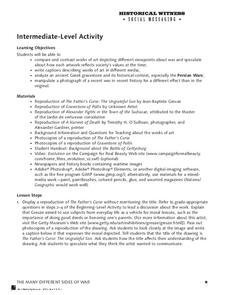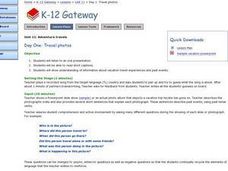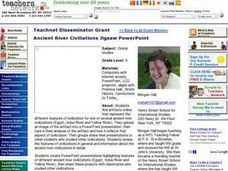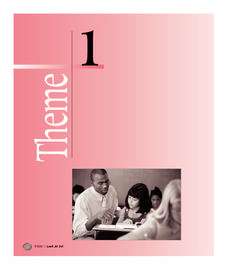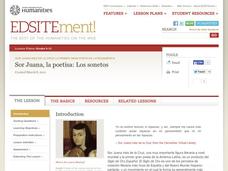National Endowment for the Humanities
The New Order for "Greater East Asia"
Sometimes the New Order becomes synonymous with its implications for European countries, but what about its consequences for East Asia? The final instructional activity in a four-part series teaches scholars about World War II. High...
Curated OER
Look Out My Window. What Do You See?
Students explore William D. Huff's experience during Civil War as portrayed in his drawings, express empathy and demonstrate historical knowledge through creating their own artwork, and craft drawings and captions from perspectives of...
Curated OER
Political Cartoon Analysis Guide
Political cartoons are very clever, and often have deep meanings. This worksheet has learners consider a political cartoon. Next, they answer four questions regarding the cartoon. A very clever and effective teaching resource.
Council for Economic Education
Production Possibilities Curve
Demonstrate the important economic principles of the production possibilities curve, including how to calculate opportunity cost and graph curves by using a table or calculation. Learners use a variety of methods, including videos,...
Mark Twain Media
Understanding Informational Text Features
Everything you need to know about informational text features can be found in this resource. Recognizing these types of text features and how they are used in text allows readers to better understand information. Teachers can use this as...
Curated OER
Historical Witness: Social Messaging
Students complete activities to study the propaganda elements from various war times. In this war propaganda lesson, students compare and contrast works of art from various viewpoints about war from varying social periods. Students write...
Curated OER
Travel Photos
Pupils describe photographs. In this travel photos lesson, students view a slide-show of travel photos in order to assist them with developing photo captions. Pupils describe details, events, and persons from the photos in the native...
Scholastic
Wrapping Up the School Year
Students complete a variety of writing and yearbook activities to complete the school year. They write a letter to the student that will sit in their desk the next school year, and a letter to their next year's teacher. As a culminating...
Curated OER
Picturing a Story
Students view slides from the movie "Hoot" and discuss characters, setting and the caption. They identify where in the rise and fall of the plot this scene takes place. They brainstorm elements needed to create a story from a picture....
Curated OER
Ancient River Civilizations Jigsaw PowerPoint
Ninth graders use captions to determine an artifact's function and to list the features of a civilization. They classify artifacts according to the 8 Features of Civilization and for each Feature of Civilization they locate one artifact...
Curated OER
The Learning Network Fill-In: Macbeth for Children
Help your learners attain vocabulary and practice reading comprehension with this cloze activity. Created by The Learning Network, this resource provides a New York Times article with the words already removed. Pupils can fill in the...
Scholastic
Study Jams! Vertebrates
Your back will be covered when you use this presentation to introduce beginning biologists to phylum chordata, the vertebrates. Five classes are defined: fish, amphibians, reptiles, birds, and mammals throughout the eight vibrant slides....
NOAA
Methane Hydrates – What's the Big Deal?
Have you ever tried to light ice on fire? With methane hydrate, you can do exactly that. The ice forms with methane inside so it looks like ice, but is able to burn. The lesson uses group research and a hands-on activity to help scholars...
Curated OER
Dig Those Descriptions
Students practice writing descriptions by researching various artifacts from ancient Egypt and writing captions for them. They read and discuss the Times article, King Tut, Museum Trailblazer, Begins Encore.
Curated OER
Martin Luther King, Jr., and the Power of Nonviolence
Students examine the philosophy of nonviolence developed by Martin Luther King, Jr. and how this turned into practice during the Civil Rights Movement. They compare these teachings to those of Mohandas K. Ghandi.
Curated OER
Lessons of the Indian Epics: Following the Dharma
Students examine how the epic poem, "Ramayana" teaches dharma, one of Hinduism's most important tenets. They read the abridged version of the "Ramayana," identify the main plot points, complete a chart, and write an essay on a moral...
Houghton Mifflin Harcourt
Look at Us!: Challenge Activities (Theme 1)
Challenge your advanced learners with this set of activities based around a common theme. Learners draw, research, share, retell stories, compare and contrast, and more over the course of these activities, which focus mostly on animals...
EngageNY
End of Unit Assessment, Part II: Storyboard Draft, Sections 2 and 3
It's time to demonstrate knowledge. With the instructive resource, pupils complete the second part of the end of unit assessment. They develop sections two and three of their storyboards about an invention, add visual elements, and then...
EngageNY
End of Unit Assessment, Part III: Storyboard Draft, Section 4
Reflection is the best teacher. Using the resource, scholars complete the final part of their end of unit assessment, the fourth section of their storyboard about an invention. Next, they track their progress using a self-reflection form.
National Endowment for the Humanities
How to Win a World War
High schoolers are have begun to learn the art of diplomacy with each other, but do they understand how diplomacy works at a global level? The second in a series of four lessons, guides scholars in evaluating primary sources. The why...
National Endowment for the Humanities
Lesson 1: The United States Confronts Great Britain, 1793–1796
After the Revolutionary War, the success of the United States was far from guaranteed. Foreign powers coveted the new land, and Great Britain challenged American sovereignty. Learners consider the challenges facing the new nation using...
National Endowment for the Humanities
Sor Juana, la poetisa: Los sonetos
Examine two of Sor Juana's sonnets in depth. Learners first listen to an audio recording or a reading of the sonnets and then analyze the structure and form, paying attention to elements of the Baroque and el gongorismo. Assess student...
Curated OER
An Encyclo-ME-dia for Every Child
Young scholars create a digital scrapbook that shows information-text and pictures that are specific to each child. They make charts and graphs. They use digital cameras, scanners, software, to write captions, stories, poems, letters,...
Curated OER
Surviving the Struggle: Ruby Bridges, Ryan White, and Anne Frank
Fourth graders develop a deeper understanding of Anne Frank's survival. They select significant subject matter for a family photo album, write photo captions expressing feelings as well as facts, and sequence material in a logical,...







